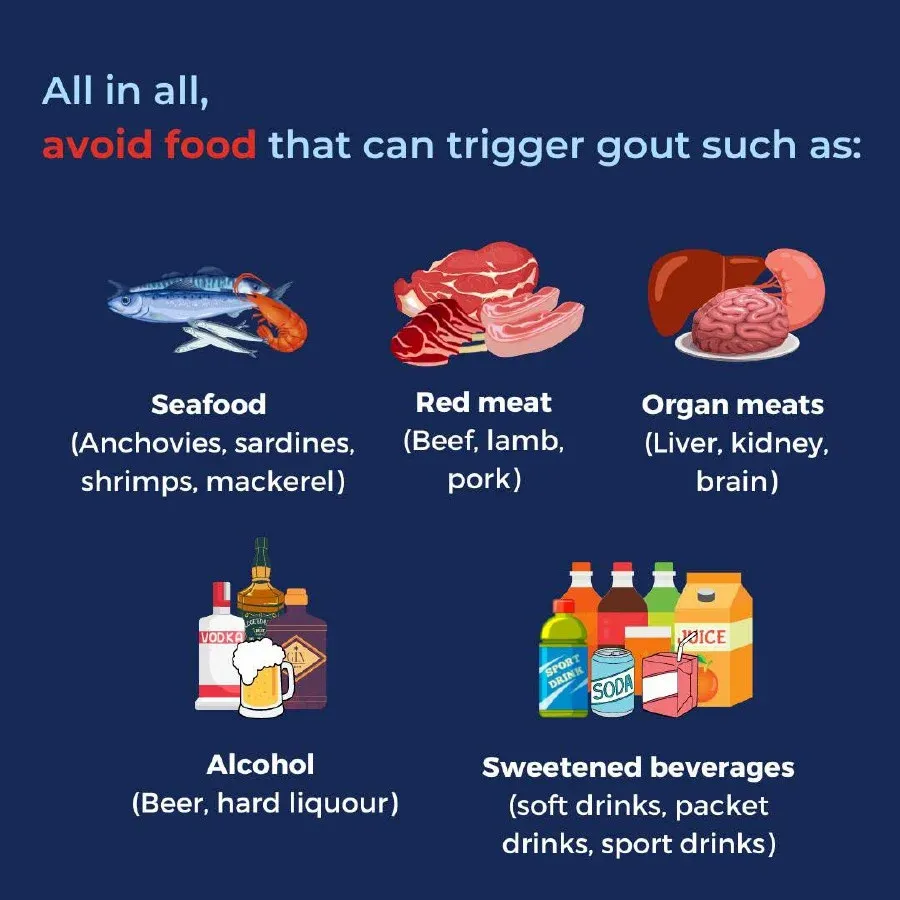Gout is a painful form of arthritis that occurs when excess uric acid builds up in the bloodstream and forms crystals in the joints, particularly in the big toe, but can effect other joints such as knees, elbows, knuckles and others. We cover in depth specifically what gout is in our previous post, here we will do a deep dive into foods to avoid with gout. While medication can help manage symptoms, one of the most effective ways to prevent gout flare-ups is by adjusting your diet. Certain foods contain high levels of purines, which the body breaks down into uric acid. Reducing the intake of these foods can help keep uric acid levels low, minimizing the risk of painful attacks.
In this post, we’ll explore the top 10 foods to avoid with gout, why they trigger flare-ups, and what you can eat instead to manage your symptoms.
1. Red Meat
Red meat, such as beef, lamb, and pork, is high in purines and due to it’s common presence in most diets is number 1 in our foods to avoid with gout list. These are broken down into uric acid in the body. Regular consumption of red meat can elevate uric acid levels, leading to more frequent gout flare-ups. Opt for leaner sources of protein such as chicken, turkey, or plant-based alternatives like tofu, which are lower in purines.
Alternatives: Chicken, turkey or tofu.
2. Organ Meats
Organ meats like liver, kidneys, and sweetbreads are rich in purines and should be avoided if you suffer from gout. While these meats may be a source of vitamins and minerals, their high purine content makes them a major trigger for gout attacks. Instead, focus on other nutrient-dense foods like vegetables and whole grains to ensure you get essential nutrients without the risk of a flare-up.
Alternatives: Vegetables and wholegrains.
3. Shellfish and Seafood
Shellfish such as shrimp, lobster, crab, and scallops are notorious for their high purine content and are high on the list of foods to avoid with gout. In addition, certain types of fish, such as sardines, mackerel, and anchovies, also contain elevated levels of purines. For people with gout, frequent consumption of shellfish and oily fish can lead to painful symptoms. Instead, choose low-purine seafood options like salmon or incorporate more plant-based proteins into your diet.
Alternatives: Salmon.
4. Sugary Beverages
Sugary drinks like sodas and fruit juices are linked to increased uric acid production, even though they don’t directly contain purines. Fructose, the sugar found in these drinks, stimulates the liver to produce uric acid, leading to a higher risk of gout attacks. Water is the best alternative, as it helps to flush out excess uric acid and keep your joints healthy. If you’re looking for flavor, try infused water with lemon or cucumber.
Alternatives: Water, tea or coffee
5. Alcohol
Alcohol is one of the top triggers for gout flare-ups, particularly beer and spirits, due to their high purine content. Beer contains yeast, which is rich in purines, while alcohol in general interferes with the body’s ability to remove uric acid. Limiting or avoiding alcohol can significantly reduce the risk of a gout attack. If you still want to enjoy a drink, wine in moderation is a better alternative, though it should still be consumed cautiously.
Alternatives: Wine – in moderation. None is better.
6. Processed Foods
Processed foods, including packaged snacks, fast food, and ready meals, often contain high levels of purines, salt, and unhealthy fats. These foods not only contribute to gout but also increase the risk of other health issues such as obesity, which is a major risk factor for gout. Focus on whole, unprocessed foods like fruits, vegetables, and whole grains, which are naturally low in purines and support overall health.
Alternatives: Fruits, vegetables and wholegrains.
7. High-Fat Dairy Products
Full-fat dairy products like whole milk, cheese, and cream can raise uric acid levels, leading to gout symptoms. Instead, opt for low-fat or fat-free dairy products, which have been shown to help lower uric acid levels. Skimmed milk, low-fat yogurt, and reduced-fat cheese are all good choices for people with gout who want to maintain a healthy diet without triggering flare-ups.
Alternatives: Skimmed milk, low-fat yogurt and reduced-fat cheese.
8. Certain Vegetables
While vegetables are generally beneficial for your health, certain ones are higher in purines and should be consumed in moderation if you have gout. These include asparagus, spinach, cauliflower, and mushrooms. However, the purine content in these vegetables is much lower than in meats and seafood, so they don’t pose as high of a risk. It’s important not to completely eliminate vegetables from your diet, as they offer essential nutrients, but balance is key.
9. Gravy and Sauces
Gravy and rich sauces made from meat drippings are high in purines and can contribute to elevated uric acid levels. They are often used in combination with purine-rich meats, which further increases the likelihood of a gout attack. If you want to enjoy sauces, consider using vegetable-based broths or light sauces made from low-fat dairy, and avoid meat-based gravies whenever possible.
Alternatives: Vegetable broths.
10. Sweets and Desserts
High-sugar desserts like cakes, cookies, and pastries can increase uric acid levels, primarily due to their high fructose content. In addition, these foods contribute to weight gain, which is another major risk factor for gout. For a sweet treat, consider fresh fruit or low-sugar alternatives like Greek yogurt with berries, which won’t have the same impact on uric acid levels.
Alternatives: Fresh fruit and Greek yogurt.

Healthy Alternatives for Foods to Avoid with Gout
It can be difficult to adjust your diet when so many everyday foods are linked to gout flare-ups. However, there are plenty of delicious and healthy alternatives that won’t trigger symptoms. Consider incorporating more of these low-purine options into your meals:
- Fruits and Vegetables: Most fruits and vegetables are low in purines and high in nutrients. Cherries, in particular, have been shown to reduce uric acid levels and inflammation, making them a great addition to a gout-friendly diet.
- Whole Grains: Foods like oats, quinoa, and brown rice are excellent sources of fiber and are low in purines, helping to support overall health without the risk of triggering gout.
- Lean Proteins: Chicken, turkey, and plant-based proteins like beans and lentils are low in purines and provide the necessary protein without increasing uric acid levels.
Managing gout through diet is one of the most effective ways to prevent painful flare-ups. By avoiding high-purine foods like red meat, organ meats, and shellfish, and limiting sugary beverages and alcohol, you can keep your uric acid levels under control. Incorporating low-purine alternatives like fruits, vegetables, and lean proteins into your meals will not only help manage your gout but also improve your overall health.
While diet plays a significant role, it’s important to remember that gout management often requires a holistic approach, including medication and lifestyle changes. By making informed dietary choices, you can reduce the frequency and severity of your gout symptoms and lead a healthier, pain-free life. Hopefully this information on foods to avoid with gout will help you make informed decisions on your diet and help you to make positive changes.

